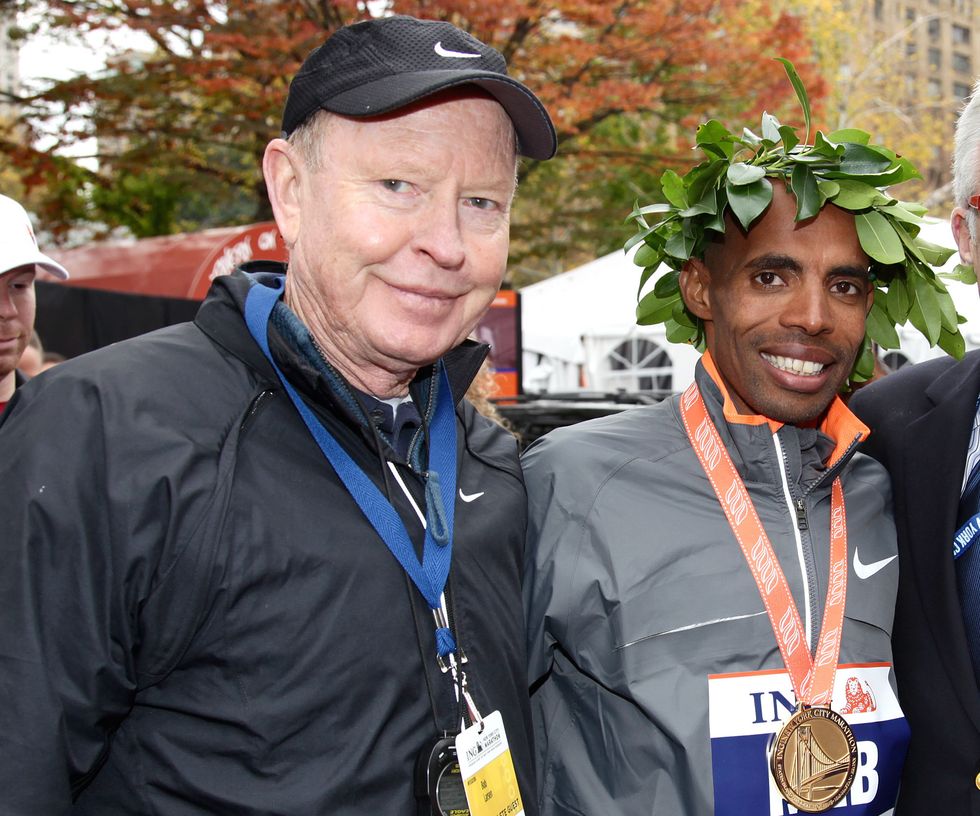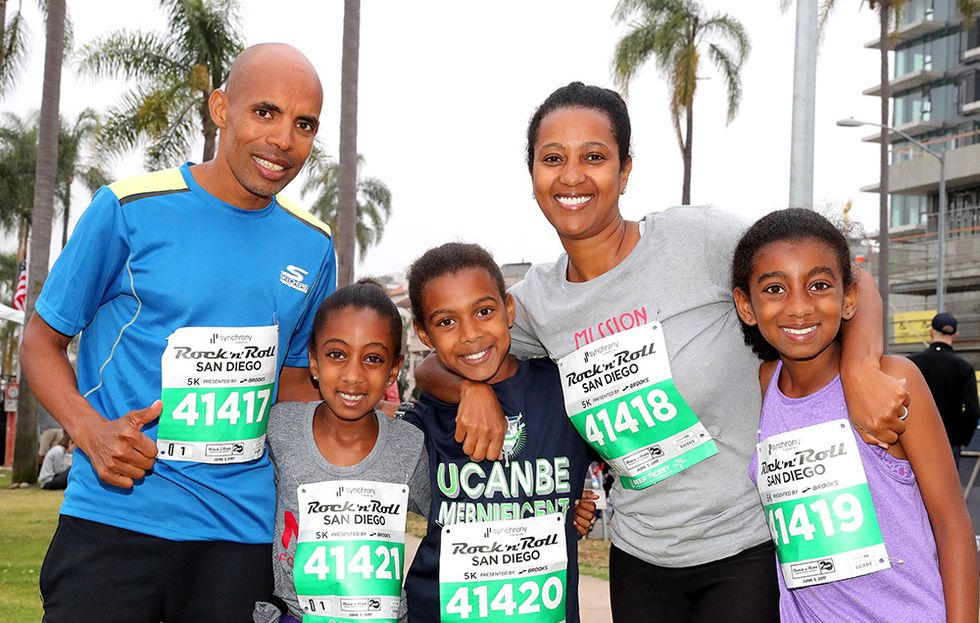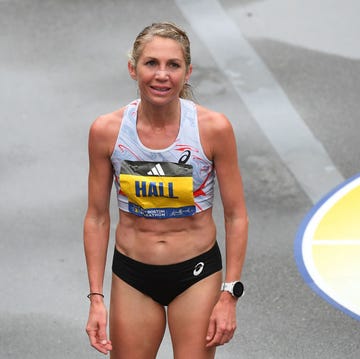Health - Injuries, Meb Keflezighi finished the final long run of his career in remarkably similar fashion as he did his first one, 18 years ago.
He traced a familiar 20-mile route in his high-altitude base of Mammoth Lakes, California. Bob Larsen, his coach of almost 25 years, awaited him at the finish, along with Deena Kastor, his original Mammoth Track Club teammate, with whom Keflezighi pioneered a resurgence in American distance running in 2001.
“It was a special moment,” Larsen said. “There were a lot of hugs and congratulations. That was the last long one. They’re not as easy as they used to be. He’s 42 years old, and it’s tougher and tougher. I’m just savoring every moment. I’m making sure I’m doing things a little bit slower, because I don’t want to rush through this.”
Published: Oct 30, 2017 5:24 PM EDT New York City Marathon, his 26th competition of 26.2 miles. When he began his career after graduating from UCLA in 1999, the country had almost no presence on the international stage. Since then, he’s brought home a 2004 Olympic marathon silver medal, won the New York City Marathon in 2009, and was the 2014 Boston Marathon champion—a trifecta that no other American can claim and which has, in part, sparked new depth in the country’s talent pool.
But as one of 11 siblings who fled war-torn Eritrea with their parents, an immigrant who came to San Diego at age 12 with little grasp of the English language, Keflezighi has transcended the accolades he’s collected in running. He’s the proverbial American dream, sometimes overlooked in the current political climate. After years of slowly gaining the respect of the media, the pundits, the sponsors, and the fans, he’s now simply adored around the world—a notable feat in a sport that goes mostly unnoticed but for every four years.
“The thing is, he’s a better person than he is a runner,” his wife, Yordanos, said. “He’s not pretentious; he’s very sociable and easy to talk to. He’s very genuine. It’s just something that comes from the heart, and it’s easy for fans to see that.”
To Keflezighi, running has always been a channel for establishing human connections—and those interactions are what have buoyed his performances. At a time when younger generations increasingly count community in social media followers and the number of “likes” they receive on Instagram posts, he finds it more fulfilling to give his thumbs up in person, whenever somebody asks.
“I’ll always give a hug or a handshake and pose for a picture,” he said. “It’s pleasing to know that people want to tell me how I’ve impacted them. It’s a wonderful position to be in…I just have tried to build bridges and connect people as much as I can and genuinely be myself.”
But to arrive at this moment has been, at times, arduous. In two decades, he could have called it quits numerous times. Like when his sponsor, Nike, dropped him seven years ago. When he broke his hip and failed to make the 2008 Olympic team while running in the Olympic Trials in New York in 2007. When he lost his friend and training partner Ryan Shay, who died of cardiac-related illness in the same race.
RELATED: Australian Sprinter, 16, Runs Record-Breaking 200m
“My heart was broken—emotionally, physically, mentally—10 years ago,” Keflezighi said. “It would have been easy to throw the towel in. I thought about it. But I knew down deep that my God-given talent was not maxed out. I was crawling like a baby, because I couldn’t stand up [from the hip injury]. Those were painful times. I really had to work hard and be patient to see the fruits of the hard work. I wanted to give people hope that good things are possible.”
And that’s the uncomplicated part of Keflezighi’s success—he developed a system early on and never wavered, even when it appeared he was done. He’s been surrounded by the same support system since day one. He’s held a singular focus on the smallest details of preparation, which have afforded him the opportunity to seize the biggest moments presented to him. Save for two weeks of rest following his races, he’s never let a stretch, drill, meal, or massage slide. His last vacation day? Unknown.
“It’s incredible talent, but more so it’s been his intelligence in putting that talent to work,” Yordanos said. “It requires a lot of sacrifices. He’s a workaholic—there’s never been an off-season for him. Always doing all the meticulous things that even when he’s home, he’s occupied with those things.”
Athletes like Keflezighi are rare, Larsen said, and his willingness to do anything to prolong his competitiveness is why he’s still considered a contender at age 42.
“Whenever you have someone who is willing to explore their full potential and maximize everything they can do, then obviously as a coach that really gets your attention,” Larsen said. “Meb was that way right from the start. In fact he was so attentive to detail that I always was careful in any suggestions I made because I wanted to be sure it would be helpful—because I knew he was going to do it.”
Yordanos recalls a moment shortly after the 2012 London Olympics, when her husband finished fourth after sitting in 20th place at the halfway point. His training had been marred by injuries, and he crossed the finish line with blisters so severe he ended up in a wheelchair in Heathrow Airport on the way to the flight home.
She was sprawled out on the hotel floor, exhausted from race day. Their three daughters were asleep on the couch while Keflezighi iced his legs. They had brought 50 or so friends and family members to come to London to be part of what all had assumed was his final competition at the Games.
“We’re talking and he says, ‘You know, I think I can go all the way to 2016,’” Yordanos said. “I really had a surreal look on my face. I didn’t express it but my thought was, ‘That’s crazy.’ Four more years seemed like a lifetime at that moment. But if he had it in his heart and in his mind, who am I or anybody else to say otherwise? I looked at this amazing man, and thought, ‘If he said it, he’s most likely going to do it so I might as well just cheer him on.’ If that’s what he wanted, I just said, ‘Hey, let us know what you need us to do.’”
The next four years brought the cancellation of the 2012 New York City Marathon, due to Super Storm Sandy, and the tragic bombings at the finish line of the 2013 Boston Marathon, which led to the most defining moment of Keflezighi’s competitive life—the 2014 Boston Marathon victory. He broke the tape with the names of the four people who died the year before written on his race bib, becoming the first American man in 34 years to win, while reclaiming joy on a devastated Boylston Street.
“I still can’t watch that Boston Marathon without a wave of emotion coming over me,” Larsen said. “It strikes me. Wow. There’s such an emotional reaction.”
And part of the glory of that day is that, once again, Keflezighi had proven he belonged among the top of the class, even when he appeared on nobody’s radar. It’s a common theme he holds in the back of his mind heading into Sunday, when he faces a field that includes a former world record holder and the defending champion. He’s healthy, with eight weeks of uninterrupted training under his feet, fueling his optimism.
“I gotta use my intuition that I’ve used in the past—get a read on it and see how everybody is feeling and go for it,” Keflezighi said. “I might be hanging on for dear life, but my goal is to finish top 10. If I could make it to the podium, that’d be awesome. If it’s not going the way I prepared for, it’ll be a victory lap.
“It’s going to be fun. I get the thrill of a lifetime when the crowd is pumped up, cheering my name, or ‘Go USA!’ In the late stage of the race, I’d like to be a contender, hopefully.”
ALSO: Meb's Final Games: A Fall and a Flourish
No matter where he ends up in the pack, however, his loyal team of nearly 70 friends and family—including Larsen, Yordanos, his brother and agent Merhawi Keflezighi, and his three daughters—is anxious to greet him at his final finish line.
“I just pray that he finishes well, in good health and good spirits,” Yordanos said. “That’s what I pray for and that’s no different than any other race he’s run. There’s nothing more rewarding than to know your life partner feels like he gave everything he had in him and that there’s nothing to go back and regret. There’s a lot of peace of mind that comes with that in a relationship.
“I’m prayerful that this is the moment he says, ‘I’m done. I’ve maximized every bit of my talent. There’s nothing more I can do.’”
As for Keflezighi, he’s looking forward to being the dad who drops his kids off at school and the husband who spends more time with his wife. And even when he steps off the course in Central Park, he vows his work with the running community isn’t over—he’ll remain involved through his work in the Meb Foundation, coaching, and speaking.
“I may be doing one marathon too much, but I’d rather it be that way. They’ve been good to me, they’ve been brutal to me, they’ve made me cry, they’ve made me crawl on the floor or take a wheelchair, but that’s the love of the sport,” he said. “I wanted to be an example of hope for our country, for runners, and for people who aren’t runners, too.
“If you have hope,” he continued, “you have everything.”














